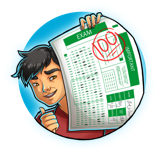Enrolling in nursing school is a significant milestone in your healthcare career. The early days of learning nursing terminology and how to remember tricky concepts and skills can be intimidating and even a bit scary. But fear not, read on for some helpful tips and tricks to get you through your hardest nursing classes!
Is nursing school hard?
There seem to be endless social media channels talking about how hard nursing school is and all the horrors of what you are likely to expect. That includes long clinical days, courses that will turn your brain into a pretzel, and intense clinical instructors. While there may be challenges, there are also great rewards, such as building lifelong friendships and shared memories about those challenging clinicals and assignments.

Nursing school is infamous for being a challenge and requiring an immense amount of time and dedication. The nursing curriculum itself is demanding and complex. You will be expected to master a wide range of skills, from pharmacology and anatomy, to patient assessment and communication. Long study hours, high-stakes exams, and clinical rotations can be overwhelming. And nursing students are expected to carry out their duties and perform in new and sometimes uncertain clinical situations flawlessly, as mistakes in real-world healthcare settings have consequences.
So yes, nursing school is hard. It’s supposed to be. But the rewards of your hard work are well worth the effort. If you have the right mindset, a positive support system and solid study habits, you can certainly thrive in nursing school and find yourself working in a highly respected and trusted profession after graduation.
What to expect when enrolling in nursing school?
Enrolling in nursing school is a significant step towards a rewarding career in healthcare, it may also be daunting. So here is what you can expect.
- Academic Rigor: To succeed in nursing school, students must possess a strong understanding of knowing how to learn. You will be expected to have a solid foundation in sciences, mathematics, language, and nursing topics.
- Clinical Training: You’ll receive hands-on training in healthcare environments and simulation settings to learn how to apply theoretical concepts and develop real-world skills.
- Curriculum: Your program will cover a broad spectrum of nursing knowledge, from core principles and pharmacology to anatomy and specialized populations like pediatrics, gerontology, and mental health.
- Time Commitment: You need to be prepared for intense study sessions, long clinical hours, and potential night or weekend shifts.
- Support Systems: Schools often provide academic advising, mentorship, and mental health resources to help manage stress. So be sure to take advantage of these!
- NCLEX Prep: Programs prepare students for the National Council Licensure Examination (NCLEX-RN), a requirement for licensure.
- Professional Development: Nursing school encourages critical thinking, communication, and teamwork skills. All of these important traits are essential for a successful nursing career. So be prepared to work on your professional development yearly.
The hardest nursing school classes

Nursing school is infamous for its intense academic demands, and certain courses stand out as especially tough. Watch out for these and get your nursing school resources lined up now.
- Pharmacology: Pharmaceutical knowledge requires a dual approach: memorizing complex medication names and applying critical thinking to anticipate interactions and side effects. You can check out our guide for some tips on how to ace pharmacology in nursing school.
- Pathophysiology: Comprehending disease mechanisms and their bodily impacts necessitates a solid grasp of anatomy and physiology.
- Medical-Surgical Nursing: Students in this class explore various adult health conditions, requiring the synthesis of extensive knowledge and critical thinking.
- Pediatric Nursing: Supporting vulnerable young patients demands a blend of specialized skills and gentle sensitivity. To learn other effective strategies see tips for passing med-surg and pharmacology in nursing school.
- Mental Health Nursing: Studying psychological disorders and developing therapeutic communication techniques can be both rewarding and emotionally draining.
- Health Assessment: Performing comprehensive patient evaluations demands expertise in physical examination techniques and accurate interpretation of results.
- Nursing Research: Translating research findings into actionable insights demands robust analytical and critical thinking abilities.
- NCLEX-RN Prep: Intensive review for the licensing exam can be stressful and overwhelming.
Staying organized, seeking support, and practicing effective time management are crucial to succeeding in these challenging classes. However, with proper preparations and use of the right resources can make all the difference in your learning and retention.
12 Tips on acing difficult nursing classes

To excel in challenging nursing classes, employ these strategies:
- Create a study schedule: Prioritize dedicated study time, breaking down complex material into manageable chunks. Make lists to keep you on track.
- Active learning: Engage with course content through flashcards, concept maps, and self-testing. Make your brain work to retain this information.
- Focus on understanding, not just memorization: Connect new information to existing knowledge and clinical experiences.This way what you learn will stick with you longer.
- Use mnemonic devices: These memory aids can significantly enhance your learning experience. One effective technique is to create visual associations. By connecting concepts to images, you can improve retention. Picmonic is a great tool for this, using memorable characters and visuals to simplify complex information.
- Seek help early: Consult instructors, peers, or tutors when struggling with concepts. Your instructors want to see you succeed!
- Practice critical thinking: Analyze case studies, simulate patient scenarios, and discuss ethical dilemmas. Connect the material to actual patients.
- Stay organized: Keep thorough notes, and utilize digital tools for note-taking and organization. Use mind mapping for a more visual experience.
- Join study groups: Collaborative learning encourages collective understanding and support. Plus it’s a great way to make new friends and build lifelong friendships!
- Review consistently: Regular review helps solidify knowledge and reduces cramming. Avoid the forgetting curve!
- Find videos that explain concepts you’re struggling with: There are many reputable websites online in which to find medical content, and these can be great adjuncts to other study methods. Although your instructor will likely do their best to explain course content in class, sometimes it takes just the right explanation or demonstration to make it click for you.
- Use NCLEX-RN prep materials: Familiarize yourself with exam formats and question types. Consider using Picmonic to enhance your learning experience with visual mnemonics and interactive quizzes for the ultimate NCLEX prep.
- Self-care: Balance academic demands with physical and mental well-being; prioritize rest, exercise, and relaxation. Be sure to check out the best nursing school advice from a nursing student for more nursing school tips.
By implementing these strategies, you’ll be better equipped to tackle challenging nursing classes and achieve academic success.
If you are ready to put some of these study tips into practice and save time studying, then start using Picmonic as your nursing school study guide. You will learn nursing with 1,200+ essential nursing school concepts in 2-3 minute mnemonic videos, boost your test scores, and have fun while you do it!
About the Author
Pamela Schutz, RPN, Medical-Nursing Scholar is a registered psychiatric nurse with over 23 years of experience specializing in trauma informed care, substance use and harm reduction strategies. Pamela effectively conveys messages with a passion for simplifying complex ideas with a rare mix of clinical, educational and business proficiency. She enjoys helping educators to provide an exceptional educational experience for students while making the captivating world of medicine less mysterious.













